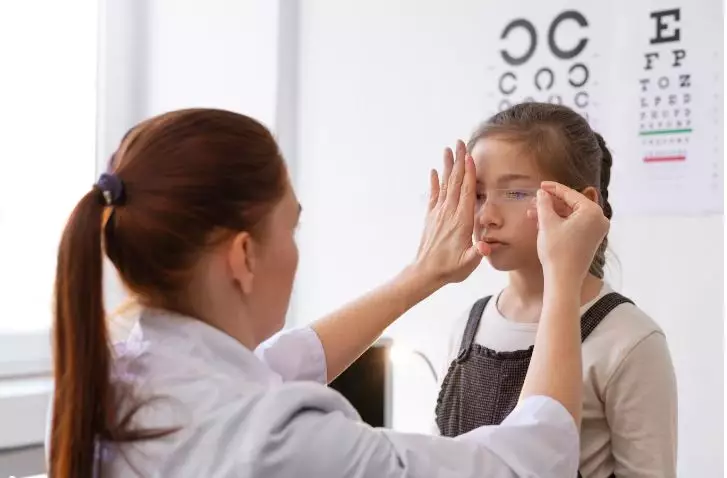foto: freepik.com
Brilio.net - Eyes are one of the most important senses for everyday life. Unfortunately, many people only realize the importance of maintaining eye health when they have vision problems in adulthood. This can actually be prevented by caring for children's eyes from an early age.
Children's eye development is still very vulnerable, so it is important for parents to pay extra attention. Providing eye care to children not only helps avoid eye health problems later in life, but can also improve their quality of life today. The good news is, there are many simple ways that can be done to maintain children's eye health from an early age.
Small habits taught to children from an early age can form a healthy lifestyle that will have a long-term impact. By providing proper care, children's eyes can be protected from visual impairment .
Here are seven simple ways that you can do to care for your child's eyes from an early age and prevent vision problems in adulthood, as reported by brilio.net from various sources, Sunday (27/10).
1. Limit screen time.

photo: freepik.com
Too much staring at gadget screens such as mobile phones, tablets, or computers can trigger vision problems. Research from the American Academy of Ophthalmology (AAO) states that excessive screen time in children can cause Computer Vision Syndrome or eye fatigue syndrome. Symptoms include tired, dry eyes, and even blurred vision.
Limit your child's screen time with clear rules. Children under the age of 5 are advised not to use gadgets for more than one hour a day. Give them a break every 20 minutes by diverting their attention to physical activity or playing outside.
2. Make sure your child gets enough natural light.Playing outdoors is not only good for your physical health, it is also important for your eye health. A study published in The Journal of the American Medical Association (JAMA) showed that exposure to natural sunlight can reduce the risk of myopia or nearsightedness in children. The study also suggested that at least two hours of outdoor play each day can help slow the progression of myopia.
Adequate exposure to sunlight also helps the body produce vitamin D, which is beneficial for overall health. Encourage children to play outside more, but make sure they wear eye protection such as sunglasses when necessary.
3. Pay attention to reading and writing positions.

photo: freepik.com/jcomp
Poor reading or writing posture can affect a child's eye health. Get your child used to maintaining the right viewing distance when doing activities such as reading or writing. The ideal distance between the eyes and a book is about 30-40 cm. Avoiding positions that are too close can reduce the risk of eye fatigue and myopia.
Teach your child to sit up straight and not to read while lying down. Also, make sure the room has good lighting so that your child's eyes don't work too hard when reading or writing.
4. Teach the habit of not rubbing your eyes.Children often rub their eyes when they feel itchy or tired. This habit can cause irritation, especially if their hands are not clean. Rubbing the eyes can also worsen problems such as conjunctivitis or pink eye caused by bacterial or viral infections.
Teach your child to avoid rubbing their eyes. If their eyes feel itchy, give them a tissue or clean cloth to gently wipe them. Also, teach them to wash their hands regularly to avoid getting dirt and bacteria in their eyes.
5. Regularly check your eye health.

photo: freepik.com
Regular eye exams are essential to ensure your childs eyes are healthy. The American Optometric Association (AOA) recommends that children have their first eye exam at 6 months of age, followed by a repeat exam at age 3, and then periodically before entering elementary school. Early detection of vision problems such as myopia, hyperopia, or astigmatism can prevent more serious problems later in life.
In addition, regular check-ups also help identify vision problems that may not be noticed by the child or parent. Don't wait until your child complains of difficulty seeing, schedule an exam immediately if there are signs of vision problems.
6. Consume nutritious foods for eye health.Healthy eyes are also influenced by proper nutritional intake. Some foods rich in vitamins A, C, E, and omega-3 fatty acids are very good for eye health.
Research from Harvard Medical School shows that nutrients like lutein and zeaxanthin, found in green vegetables like spinach and kale, may help protect the eyes from UV damage and prevent macular degeneration.
Give your child a diet rich in colorful vegetables, fruits, fish, and nuts. Getting your child used to eating nutritious foods from an early age will help maintain their eye health into adulthood.
7. Make sure your child rests his eyes regularly.Children's eyes also need rest after being used to focus on one thing for a long time. The 20-20-20 principle can be applied, where every 20 minutes the child should look at something 20 feet (about 6 meters) away for 20 seconds. This method helps reduce eye fatigue, especially when children are studying or staring at the screen for a long time.
Regularly resting the eyes is also important when children are reading books or playing gadgets. Teach them to pause, look into the distance, and rest their eyes before continuing their activities.
(brl/lea)